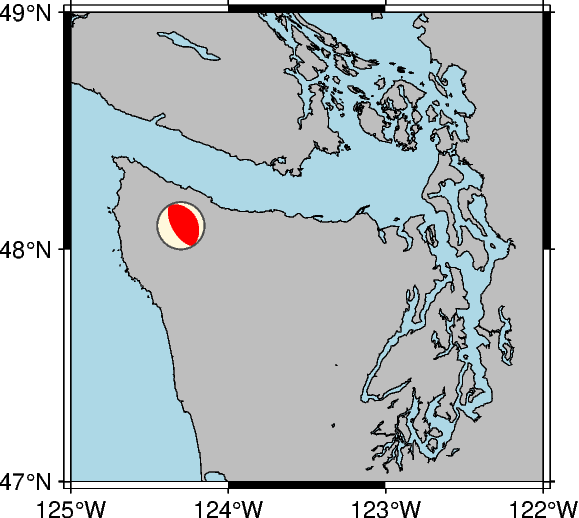Note
Go to the end to download the full example code.
Focal mechanisms
The pygmt.Figure.meca method can plot focal mechanisms or beachballs.
We can specify the focal mechanism nodal planes or moment tensor components
as a dictionary using the spec parameter (or they can be specified as a
1-D or 2-D array, or within a file). The size of the beachballs can be set
using the scale parameter. The compressive and extensive quadrants can
be filled either with a color or a pattern via the compressionfill and
extensionfill parameters, respectively. Use the pen parameter to
adjust the outline of the beachballs.

import pygmt
fig = pygmt.Figure()
# Generate a map near Washington State showing land, water, and shorelines
fig.coast(
region=[-125, -122, 47, 49],
projection="M6c",
land="grey",
water="lightblue",
shorelines=True,
frame="a",
)
# Store focal mechanism parameters in a dictionary based on the Aki & Richards
# convention
focal_mechanism = {"strike": 330, "dip": 30, "rake": 90, "magnitude": 3}
# Pass the focal mechanism data through the spec parameter. In addition provide
# scale, event location, and event depth
fig.meca(
spec=focal_mechanism,
scale="1c", # in centimeters
longitude=-124.3,
latitude=48.1,
depth=12.0,
# Fill compressive quadrants with color "red"
# [Default is "black"]
compressionfill="red",
# Fill extensive quadrants with color "cornsilk"
# [Default is "white"]
extensionfill="cornsilk",
# Draw a 0.5 points thick dark gray ("gray30") solid outline via
# the pen parameter [Default is "0.25p,black,solid"]
pen="0.5p,gray30,solid",
)
fig.show()
Total running time of the script: (0 minutes 0.154 seconds)